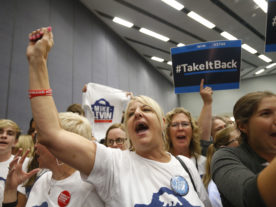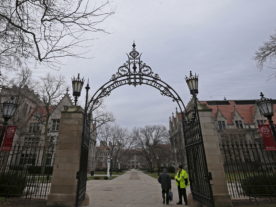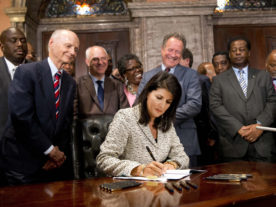
Students celebrate after graduating from Harvard University on May 28, 2015, in Cambridge, Massachusetts. (AP Photo)
The brightest Americans live in Massachusetts while people in Mississippi are at the bottom of the ‘smart’ list, according to Zippia, a career resource site, which ranked all 50 states.
It appears America’s brightest can be found in the Northeast or in sunny California. Forty percent of adults in top-ranked Massachusetts have at least a bachelor’s agree and the state’s dropout rate is just 3 percent. In comparison, 20 percent of people in Mississippi — the lowest ranked state — went to college. The high school dropout rate there is 6.2 percent.

New Hampshire voters listen as Republican presidential candidate, Ohio Gov. John Kasich speaks during a campaign stop at the Conway, New Hampshire public library, Jan. 15, 2016 (AP Photo)
Other states in the top 10 include Vermont, Virginia, New Hampshire, Connecticut, New Jersey, Minnesota, Maryland, and Nebraska. The ‘least smart’ states include Louisiana, Nevada, Oklahoma and Arkansas.
American voters might be happy to hear that New Hampshire — which holds the first-in-the-nation primary that influences the rest of the U.S. presidential campaign season — ranks as the fourth smartest state in the nation. Thirty-four percent of adults there have a college degree and the high school dropout rate is 2.4 percent.
Zippia turned to data from the U.S. Census to determine its rankings, equating education levels with intelligence. The career resource website looked at the percentage of adults — over age 25 — with at least a college degree, and the percentage of high school dropouts — aged 16-19 — in each state.
To determine intelligence, Zippia did not look at tests such as the SAT — an exam American students take in high school which is used by colleges to help determine whether to accept the student for admission — or intelligence tests that might be biased against certain people or places.
Zippia says there are serious reasons for developing a ranking of the brightest states.
“One of the many qualities that people look for in a potential location or company is the intelligence of those around them. This factor can play a huge role in one’s experience at a particular company and can make or break an employee’s time there,” according to the report. “So finding a state with an intelligent population makes sense for both companies and employees.”
























